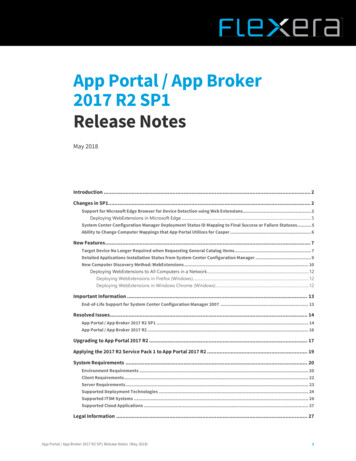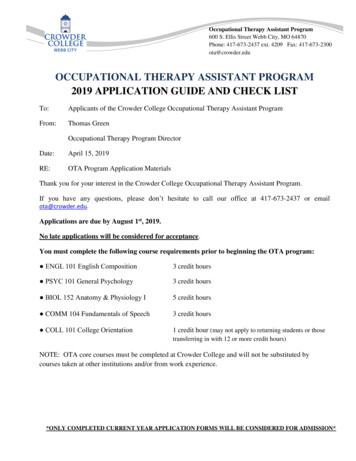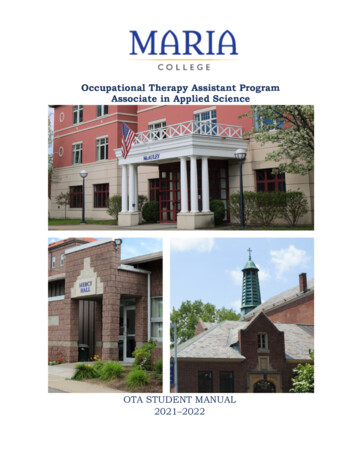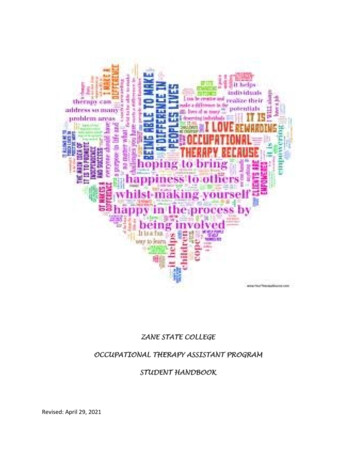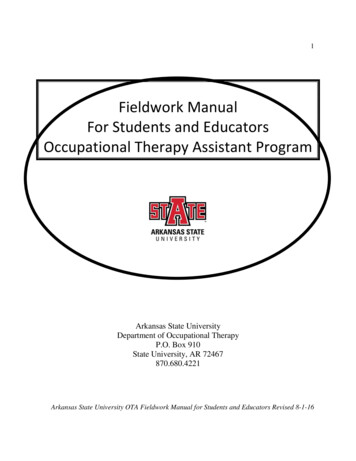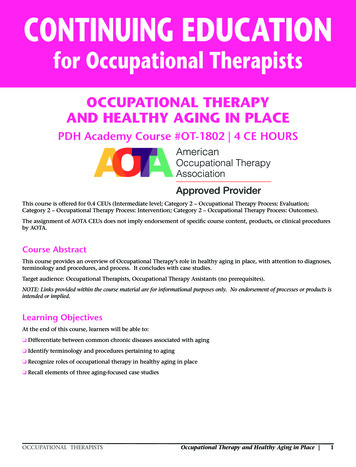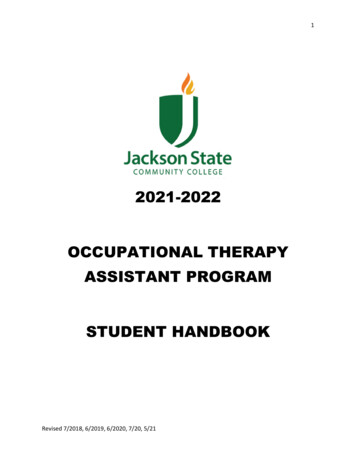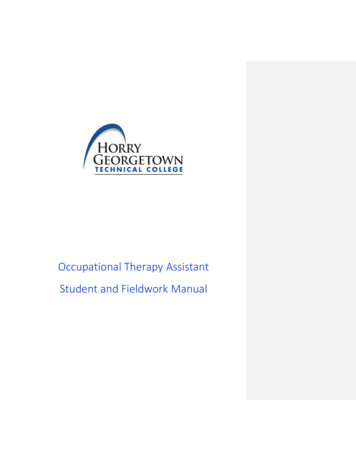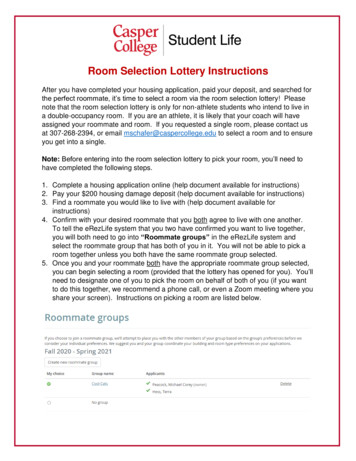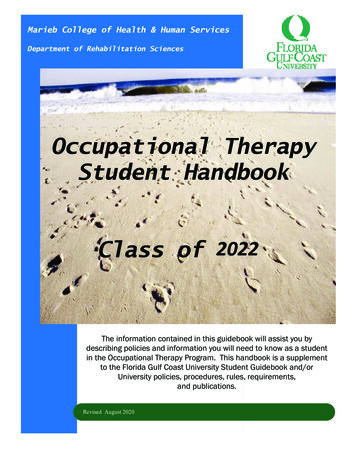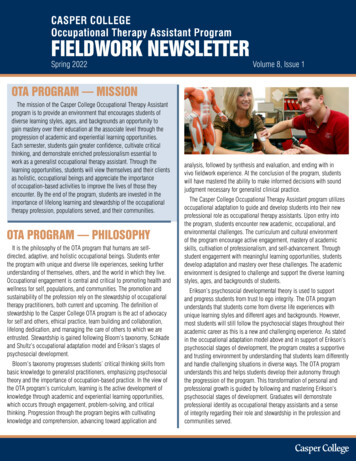
Transcription
CASPER COLLEGEOccupational Therapy Assistant ProgramFIELDWORK NEWSLETTERSpring 2022Volume 8, Issue 1OTA PROGRAM — MISSIONThe mission of the Casper College Occupational Therapy Assistantprogram is to provide an environment that encourages students ofdiverse learning styles, ages, and backgrounds an opportunity togain mastery over their education at the associate level through theprogression of academic and experiential learning opportunities.Each semester, students gain greater confidence, cultivate criticalthinking, and demonstrate enriched professionalism essential towork as a generalist occupational therapy assistant. Through thelearning opportunities, students will view themselves and their clientsas holistic, occupational beings and appreciate the importanceof occupation-based activities to improve the lives of those theyencounter. By the end of the program, students are invested in theimportance of lifelong learning and stewardship of the occupationaltherapy profession, populations served, and their communities.OTA PROGRAM — PHILOSOPHYIt is the philosophy of the OTA program that humans are selfdirected, adaptive, and holistic occupational beings. Students enterthe program with unique and diverse life experiences, seeking furtherunderstanding of themselves, others, and the world in which they live.Occupational engagement is central and critical to promoting health andwellness for self, populations, and communities. The promotion andsustainability of the profession rely on the stewardship of occupationaltherapy practitioners, both current and upcoming. The definition ofstewardship to the Casper College OTA program is the act of advocacyfor self and others, ethical practice, team building and collaboration,lifelong dedication, and managing the care of others to which we areentrusted. Stewardship is gained following Bloom’s taxonomy, Schkadeand Shultz’s occupational adaptation model and Erikson’s stages ofpsychosocial development.Bloom’s taxonomy progresses students’ critical thinking skills frombasic knowledge to generalist practitioners, emphasizing psychosocialtheory and the importance of occupation-based practice. In the view ofthe OTA program’s curriculum, learning is the active development ofknowledge through academic and experiential learning opportunities,which occurs through engagement, problem-solving, and criticalthinking. Progression through the program begins with cultivatingknowledge and comprehension, advancing toward application andanalysis, followed by synthesis and evaluation, and ending with invivo fieldwork experience. At the conclusion of the program, studentswill have mastered the ability to make informed decisions with soundjudgment necessary for generalist clinical practice.The Casper College Occupational Therapy Assistant program utilizesoccupational adaptation to guide and develop students into their newprofessional role as occupational therapy assistants. Upon entry intothe program, students encounter new academic, occupational, andenvironmental challenges. The curriculum and cultural environmentof the program encourage active engagement, mastery of academicskills, cultivation of professionalism, and self-advancement. Throughstudent engagement with meaningful learning opportunities, studentsdevelop adaptation and mastery over these challenges. The academicenvironment is designed to challenge and support the diverse learningstyles, ages, and backgrounds of students.Erikson’s psychosocial developmental theory is used to supportand progress students from trust to ego integrity. The OTA programunderstands that students come from diverse life experiences withunique learning styles and different ages and backgrounds. However,most students will still follow the psychosocial stages throughout theiracademic career as this is a new and challenging experience. As statedin the occupational adaptation model above and in support of Erikson’spsychosocial stages of development, the program creates a supportiveand trusting environment by understanding that students learn differentlyand handle challenging situations in diverse ways. The OTA programunderstands this and helps students develop their autonomy throughthe progression of the program. This transformation of personal andprofessional growth is guided by following and mastering Erikson’spsychosocial stages of development. Graduates will demonstrateprofessional identity as occupational therapy assistants and a senseof integrity regarding their role and stewardship in the profession andcommunities served.
CURRICULUM DESIGN OVERVIEWIn the view of the Casper College OTA Program, learning isthe mastery of knowledge through a supportive and challengingenvironment and academic and experiential learning, thereby cultivatingcritical thinking and professionalism. The Casper College OTAProgram’s curriculum is guided by Bloom’s taxonomy from simple tocomplex, along with Schkade and Schultz’s occupational adaptationmodel to provide a challenging and supportive learning environment.The learning environment is unique by providing students with directaccess to a therapy gym, assistive technology lab, occupations lab,kitchen classroom, private study rooms, outdoor learning space, libraryresources, and technology. The OTA program faculty also utilize ErikErickson’s psychosocial stages of development to guide and developeach student’s transition towards an entry-level generalist practitioner.The classes are intentionally sequenced to develop mastery over entrylevel occupational therapy skills. The faculty teaches through a varietyof approaches intended to actively engage individuals and integrateoccupational therapy knowledge through active discussions, hands-onsimulation, role-playing, community engagement, active self-reflection,critical thinking, and evaluation.OTA PROGRAM — OUTCOMESThe Casper College Occupational Therapy Assistant Program willgraduate students who:1. Demonstrate adaptation and mastery over academic challengesby successfully completing their education at the associatelevel to earn their Associate of Science degree in occupationaltherapy assistant.2. Demonstrate the mastery of academic and experiential learningand apply this knowledge to successfully pass the National Boardof Certification of Occupational Therapy exam.3. Demonstrate professionalism and lifelong learning by obtainingand maintaining licensure in the state of Wyoming and/or theirchosen state of practice.4. Demonstrate integrity and professionalism while following theAmerican Occupational Therapy Association’s OccupationalTherapy Code of Ethics, which is essential to work as a generalistoccupational therapy assistant.5. Appreciate and implement evidence-based practice throughclient-centered, occupation-based activities when serving theneeds of a person, population, and community.6. Are self-directed, adaptive, and holistic generalist practitioners.7. Are lifelong learners and demonstrate stewardship to theoccupational therapy profession, populations served, andtheir communities.The CC OTA program is six consecutive semesters in length with atotal of 78 credit hours. The fall semester is considered a curricularLevel I semester. Students apply to the OTA program during this fallsemester. Upon being accepted into the OTA program, the students startthe official program in the spring semester. The initial spring semesterOTA classes are curricular Level I and Level II. The curricular levelscontinue until completion of the OTA program.Although the OTA program is not a distance-education program, webelieve in utilizing the learning management system Moodle to enhancedelivery options for diversified learning needs. Thus, some coursesare available completely online, hybrid or face-to-face to meet theoccupational adaptation learning needs of students.FIELDWORK EDUCATORRESOURCES:Casper College Occupational Therapy Assistant Program rapy-assistant.Casper College OTA Program Fieldwork therapy-assistant.American Occupational Therapy Association FieldworkEducation x.Fieldwork Educators Certificate shop.aspx.
CASPER COLLEGE OTACLUB HIGHLIGHTSThe Casper College OTA Club is used in conjunction with academicsto encourage students to develop their stewardship skills, empathy, andintegrity for creating a better community. Developed and created a sensory room in the GoodsteinFoundation Library. In 2019, the Casper College GoodsteinFoundation Library received an Innovations Grant to createa sensory room in the library. We’re happy to announce thatthe project, completed in collaboration with students fromCasper College’s Occupational Therapy Assistant Club, OTAProgram Director Cassady Hoff MSOT, OTR/L, and LibrarianBeth Floyd, was recently finished and is ready for student andcommunity use! The intent of the sensory room in the librarywas to create a safe room that will allow college students withsensory sensitivities to regulate their emotions and needs in acollege environment for academic success to complete theirhomework and study. The OTA students spent time choosing theright location, a space that would benefit the student with thesensitivity need and ensure it would not disrupt other studentsin the library. The location was also chosen based on its easyaccess for students with disabilities and communication needs.Next, the occupational therapy assistant student researchedand collaborated with Hoff. The room color, the set-up ofthe desks, calming interventions, weighted blankets, noisecanceling headphones, and lights were carefully selected toallow the college students to have their own choice of toolsand equipment that would be beneficial to their own specificneeds. This room is beneficial to help those that may haveanxiety, attention deficit challenges, auditory challenges, or justhigh-stress levels. The room is definitely an attribute for CasperCollege so that recruiters will be able to verbalize to potentialstudents that the college has a study room to help students withand without disabilities be able to decompress and increasetheir academic success and improve their mental health wellbeing, in a college environment. This new room shows thatthe faculty and staff here at Casper College want CC studentsto succeed. Through collaborative efforts, the college will findways to put its students’ needs first. The room is available forstudent and community use by walk-ins and can be booked onthe library’s website, caspercollege.edu/library, using the “BookA Study Room” link! Purchased a log swing and a wood table with a game ofcheckers painted on it to encourage stress management forcollege students. The table is located in the rose garden in themiddle of Liesinger Hall. Created COVID-19-friendly packets for Wyoming MedicalCenter/Banner Health to provide to clients in the COVID wing. Purchased and donated an activity board for Wyoming MedicalCenter/Banner Health for Alzheimer’s and dementia clients. Donated monetary support and supplies to Reach 4A Star RidingAcademy to help with the costs associated with the horses. Acornhole board was built by an OTA student and donated toReach 4A Star Riding Academy as well. Six robotic therapeutic cats were purchased and donated tovarious locations within Casper. Bi-weekly Wyoming Assistive Technology Resources labs wereheld to help educate and support seniors in assistive technologyto improve their quality of life. The labs were available aroundthe state of Wyoming. Tuesday’s lab was on campus, andThursday’s lab was held via Zoom. Monetary support was provided to 2021 OTA program graduatesfor National Board for Certification in Occupational Therapystudy materials. Held a fundraiser to help fund the OTA students’ trip to thenational conference or received study materials for theNBCOT exam. Handcrafted cards were distributed to various local businessesfor the holidays.
FIELDWORK CHANGESNavigating fieldwork through the pandemic the past year and a halfhas been challenging! We are so very fortunate to have such amazingfieldwork educators and fieldwork sites who have been supportive of theprogram and worked with us through these challenges. Thank you!Regarding COVID-19, the program has made some changes regardingcommunity experience fieldwork to navigate these challenges. Forcommunity experience, first-year OTA students in the past havetraditionally completed 40 hours of observation in a variety of clinicalsettings, including pediatrics, mental health, adult physical disabilities,geriatrics, and developmentally delayed. Due to COVID-19, theseobservations for the first-year students are now completed through theICE Learning Center through the use of ICE videos.The ICE videos were developed by Jan Davis, MS, OTR/L, andthere are over 200 videos of actual therapists working with actualclients. The videos address a variety of diagnoses, settings, includingacute care hospitals, outpatient therapy, home health, etc., andtreatment interventions.Students are assigned specific videos to watch and then completeguided reflection questions and assignments. These questionsand assignments are specifically designed to guide each student’sobservation skills through the treatment session. The reflectionquestions also require students to research diagnoses, the symptomsof the diagnosis, safety considerations, causes and risk factors ofeach diagnosis, etc. The students are also required to research varioustreatment interventions and tools specific to the diagnosis, such asadaptive equipment and/ or assistive technology available.Upon completing the assigned community experience observationsand assignments, the students participate in the fieldwork integration.The instructor and students further discuss observations, additionaltreatment considerations, identify the OT/OTA role in each setting, andanswer any additional questions the students may have aboutthe observations.A wonderful benefit of the use of the ICE videos is that the studentshave the opportunity to rewind and review the session as many times asthey would like, as well as the ability to access the videos at times thatwork best with the student’s schedule. Although the ICE videos cannotreplace observations in the clinical setting, the students have identifiedhow beneficial the adapted community experience fieldwork has been inincreasing their understanding of the occupational therapy profession,the role of the OTA in each setting, and increased their observationskills.In the spring semester, the students continue their observations withthe ICE videos and have opportunities to hear from guest speakers whoshare their personal experiences with occupational therapy. The studentsalso complete the KORU Mindfulness training to not only assist withmanaging stress throughout the OTA program as a student but also touse this information for future client interactions.Please let me know if you have questions about the communityexperience or are interested in learning more about how the fieldworkexperience has been modified. Additional information regarding the ICELearning Center can be found at: icelearningcenter.com.For Level I fieldwork, the students complete one-week fieldworkexperiences in the clinical setting. During the fall semester, eachstudent completes fieldwork experiences in pediatric and mental/behavioral health settings, in both traditional and nontraditional settings.During the spring semester, the students complete one-week fieldworkexperiences in adult physical disabilities and geriatric settings, withan additional 16 hours completed in developmentally, emerging andnontraditional settings. The new Level I Fieldwork Evaluation form hasbeen implemented for four semesters and provides increased feedbackto the students to better prepare the OTA students for Level II fieldwork.The electronic American Occupational Therapy Association’sFieldwork Performance Evaluation for the Occupational TherapyAssistant Student was implemented for the first time for the 2021summer semester. Although there were a few minor hiccups initiallywhen implementing the form, the overall response to the use of theelectronic form has been positive! For fieldwork educators who havenot used the electronic form, training information is available throughthe academic fieldwork coordinator and AOTA at aluations.aspx. If you are interestedin this information, please contact Missy Neff at mneff@caspercollege.edu or phone at 307-268-2054.Thank you again for your continued support of the Casper CollegeOTA Program!
FIELDWORK NOTESUPCOMING LEVEL I ANDLEVEL II FIELDWORKSpring 2022:Level I Fieldwork Dates Spring 2022:By Missy Neff, MSOT, OTR/LLevel I fieldworks for the spring semesterare scheduled for March 7-11 and April18-22, 2022. Students will complete Level Ifieldwork rotations in adult physical disabilityand geriatric settings. The OTA student willalso complete 16 hours of Level I fieldwork indevelopmentally delayed, emerging, and nontraditional settings.Fall 2022:The fall semester Level I fieldwork dates are scheduled for October24-28 and November 14-18, 2022. Students will complete their fallLevel I fieldwork rotations in pediatrics and mental/ behavioral healthsettings. If you are interested in supervising a student for Level Ifieldwork, please contact me.We appreciate your continued support of the OTA Program and yourwillingness to supervise our students. As a fieldwork educator, if thereare any questions or additional fieldwork resources we can help with,please contact me, Missy Neff, academic fieldwork coordinator, byphone at 307-268-2054 or by email at: mneff@caspercollege.edu.FROM THE DIRECTORBy Cassady Hoff, MSOT, OTR/LThe Casper College OccupationalTherapy Assistant Program has its on-sitereaccreditation with the Accreditation Councilfor Occupational Therapy Education in May.The faculty has been working hard onincorporating new ACOTE standards into allaspects of the program.Through this process, the faculty identified the need to update themission, philosophy, program outcomes, and curriculum design of theOTA program to accurately represent the values, beliefs and teachingmethodology of the faculty and adapt to the student trends in education.The OTA faculty believe that these changes will help grow anddevelop knowledgeable and ethical occupational therapy assistantsthat will help further the profession within the state of Wyoming andsurrounding states.The Casper College Occupational Therapy Assistant program is accredited by the Accreditation Council for OccupationalTherapy Education (ACOTE) of the American Occupational Therapy Association (AOTA), located at 6116 ExecutiveBoulevard, Suite 200, North Bethesda, MD 20852-4929. The AOTA’s phone number and website are 301-652-AOTA(2682), www.acoteonline.org.March 7-11, 2022April 18-22, 2022Level I Fieldwork Dates Fall 2022:October 24-28, 2022November 14-18, 2022Recommended 2022 Level II Fieldwork Dates:May 23-July 15, 2022July 25-September 16, 2022
CERTIFICATE UPDATESIn the past few years at the OTA program, certificate practicums haveproven to be the most challenging and the most rewarding in manydifferent ways. Due to COVID, I feel much more creative with distancelearning and how to make courses work in many different ways. We areable to offer courses in-person with video conferencing as an option forstudents who live outside of Casper. This has helped to really changethe dynamic in some of our practicum courses.The assistive technology practicum continues to support ourrelationship with Wyoming Assistive Technology Resources. Overthe past year, students have hosted labs in person and on zoom tosupport the Tech2Connect Program by providing training and creatinginstructional videos for seniors in the state of Wyoming. We were able todo two open labs at the Casper Senior Center this fall, and they were agreat success. We are looking forward to doing this again in the spring.Also, over the past year, I have been lucky enough to work with theWyoming Center on Aging to provide occupational therapy perspectiveand input to their Wyoming Dementia Together program. We meet biweekly to present and support caregivers in the state of Wyoming. Thisopportunity has opened many doors for our gerontology students. Weoffer guest speakers from the Wyoming Center on Aging and WyomingDementia Care.Karol Sanstistevan has continued to offer the Equine Assisted Therapypracticum. Karol accepts students every summer, allowing studentsmany opportunities and flexibility to schedule lab times as Reach 4AStar Riding Academy has many events throughout the summer. We areso lucky that our students have the opportunity to learn through thisunique and nontraditional setting.All in all, the past year has brought many opportunities and newexperiences for the students in the COTA program and certificatecourses. I am thankful for the challenges the past year has brought, asit has pushed me to communicate better and be more creative with howtechnology can be used.Casper College is an equal opportunity institution and as such, does not discriminate on the basis of race, sex, color, nationalorigin, religion, age, veteran status, political affiliation, disability, sexual orientation, gender identity, or any other characteristicprotected under applicable federal, state, or local law in admission or access to or treatment or employment in its educationalprograms or activities. Direct inquiries or complaints concerning Title IV, Title IX, and Section 504 to Linda Toohey, associate vicepresident for student services, at 125 College Dr., Casper, WY 82601, 307-268-2667, or linda.toohey@caspercollege.edu, or theU.S. Department of Education, Office for Civil Rights, 1244 Speer Blvd., Ste. 310, Denver, CO 80204-3582, 303-844-5695 orTDD 303-844-3417.THANK YOU!We would like to thank the following Level I and Level II fieldworksites and fieldwork educators for their continued support of the CasperCollege OTA Program. WE APPRECIATE YOU!!!Advance TherapyElkhorn ValleyAdvancing AbilitiesRehabilitation HospitalAlbany County School District #1 I-Reach 2ARC of Natrona CountyMarcus DalyCampbell County HealthRehabilitation ServicesCAMP HippoNatrona County School DistrictCasper Orthopedic Therapy Center Physical Therapy CenterCheyenne Regionalof WyomingMedical CenterRocky Mountain TherapyChild Development Center ofRopes and RosesNatrona CountyTherapy ServicesChildren’s Resource Center CodySensational KidsChildren’s Therapy PlaceUtah State HospitalEarly Intervention ProgramWyoming Behavioral InstituteElite TherapyWyoming State Hospital
OTA PROGRAM — OUTCOMES. The Casper College Occupational Therapy Assistant Program will graduate students who: 1. Demonstrate adaptation and mastery over academic challenges by successfully completing their education at the associate level to earn their Associate of Science degree in occupational therapy assistant. 2.
